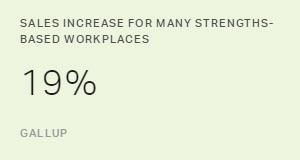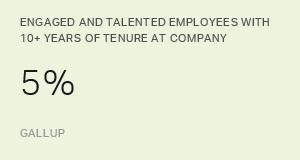Story Highlights
- Most managers who focus on strengths engage their employees
- Managers must make theoretical strengths concepts a reality
- Managers can't assume employees know how to use their strengths
This is the second article in a seven-part series.
Gallup recently conducted global research on companies that have implemented strengths-based management practices. We found that 90% of the groups studied had performance increases at or above the following ranges:
- 10% to 19% increase in sales
- 14% to 29% increase in profit
- 3% to 7% higher customer engagement
- 6% to 16% lower turnover (low-turnover organizations)
- 26% to 72% lower turnover (high-turnover organizations)
- 9% to 15% increase in engaged employees
- 22% to 59% fewer safety incidents
Even at the low end, these are impressive gains. In working with hundreds of organizations, Gallup uncovered the characteristics common among companies that accomplished the most with their strengths interventions. These companies often work toward creating a strengths-based culture using seven strategies. This article focuses on the second of these seven strengths strategies: manager alignment.
Getting Managers on Board
When it comes to getting the most out of employees' strengths and unlocking their potential, managers play an essential role. Nearly seven in 10 employees who strongly agree that their managers focus on their strengths or positive characteristics are engaged at work.
In sharp contrast, just 1% of workers who strongly disagree that their managers focus on their strengths are engaged. Because of their pivotal role in developing and leading employees, managers are a bridge between strengths concepts and the reality of a living, breathing culture of strengths.
Best Practices for Managers
Know your own strengths. To best develop other workers' strengths, managers first need to understand their own. No two managers are identical -- and all workers, including managers, are at their best when they take a strengths-based approach to their work. Managers who play to their own strengths enhance their abilities and establish a unique management style. This practice fosters an environment where employees feel comfortable discussing their strengths and limitations: When managers are authentic and open about their own strengths, employees follow suit.
Don't assume employees know how to use their strengths. Understanding one's own strengths does not automatically lead to effective use of those strengths in the workplace. Managers can help employees do both, including helping them see how their strengths and their teammates' strengths can work together. To build on one another's strengths and accept and accommodate differences, employees need to be aware of how their strengths complement those of their peers. Managers should ensure employees know what they and their coworkers bring to the table.
Help workers who aren't using their strengths. When workers fixate on their weaknesses or don't apply their strengths to a task, great managers redirect their attention to what they do best. And when job demands require workers to complete tasks that don't play to their strengths, great managers provide recommendations and support systems -- such as strategic partnerships -- to help employees overcome challenges. Strengths determine employees' best pathways for success -- how each individual can accomplish a given set of objectives based on who they are and who else they have on their team.
Harmonize team strengths. For maximum team performance, managers should factor in strengths when creating their teams. Any team can be positioned to succeed when team members understand and leverage one another's strengths. But managers can further optimize groups of employees by thoughtfully assembling teams as they consider how bringing together workers with complementary strengths can improve performance. Great managers also use developmental employee meetings to deepen their understanding of each worker's strengths and to assign tasks that best match each employee's natural talents.
Keep strengths top of mind. The world's best managers ensure their employees take a strengths-based approach to every task. One winning strategy for maintaining a strengths focus is to use team meetings to discuss strengths. For example, managers can start meetings by recognizing a team member's strengths or by reviewing how team members are applying their strengths to a current project. Some managers even create charts with each team member's strengths prominently displayed -- offering a constant reminder to workers about the importance of playing to their strengths.
Individualize recognition with consideration of strengths. To fulfill each employee's needs for feedback and recognition, managers should consider each worker's natural dispositions -- realizing that one worker's ideal recognition might differ from another's. For example, public awards might be highly meaningful to some workers but uncomfortable to others. Managers should consider what is most motivating to each individual worker when determining how best to deliver recognition and feedback.
The best way to help others develop and grow is to identify and build on their strengths. Now more than ever before, employees expect their managers to support or even guide their development. Managers who take this role seriously should make strengths-based development their approach, consistently enacting proven strategies such as holding frequent meetings with each worker, providing strengths-specific opportunities for growth and helping each worker establish goals based on their strengths.
The next article in this series will focus on how to generate awareness of and enthusiasm for strengths through internal communication.
Bailey Nelson contributed to this article.



